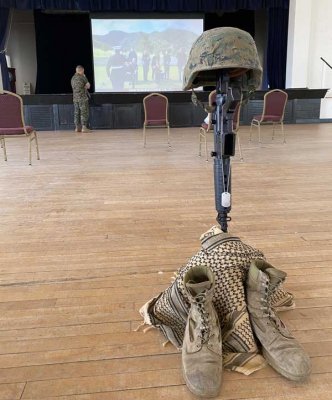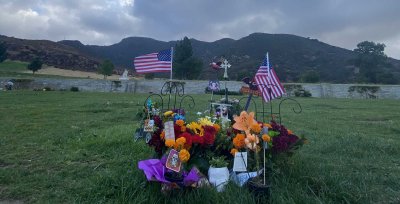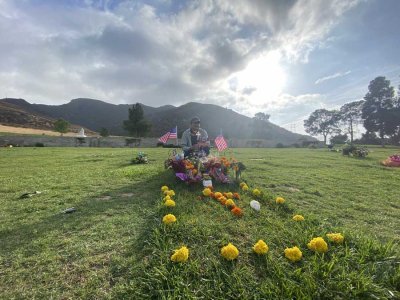I Lost One of My Marines to Suicide. Maybe Being Honest About My Blind Spots Will Help.
I couldn’t bring myself to go into his barracks room and view the body. I stood just outside the door, one in an endless row of identical entrances on the second deck, as the NCIS agent described the scene inside.
“Go straight back into the bedroom, button hook right into the closet, and you’ll see him hanging there on the left, feet propped up on a chair. His body is frozen in an ‘L’ shape. Rigor mortis set in. Looks like he’s been here all night. You’ll smell it.”
I put my hand on the doorknob and almost puked. He was my Marine, but I couldn’t go in—not until a day or two later, after his body had been removed. Then my mind played tricks on me. Every time I glanced toward the closet, I saw him hanging there—wearing the brown hiking shoes he always wore, jeans, a plaid shirt. His dress blues belt around his neck.

Small groups of Marines pay their respects throughout the day while a projector screen plays footage from Lance Corporal A’s funeral back home in Los Angeles. Photo courtesy of the author.
Less than one year earlier, at age 33, I had assumed company command of Company B, Marine Cryptologic Support Battalion, the commanding post of 230 Signals Intelligence Marines assigned to the National Security Agency at Fort Meade, Maryland. I’d spent 10 years as an active-duty Marine by then, and I began my new role full of spunk and excitement. I kept a list of activities, exercises, and events I planned for my Marines. Low on my list of priorities: mental health. Yet it would consume much of my time and energy.
In the first months of my command, I sent a Marine to the hospital for suicidal ideation and referred a handful of others to behavior health psychiatrists. Five months into command, one of my Marines survived a suicide attempt that put him in a coma for three days.
Then, nine months later: Lance Corporal A has committed suicide.
The news came over text message, sent from my company executive officer who’d already tried twice to call me as I lay in a hospital bed at Walter Reed. I hadn’t had time for the appointment, but there I was, listening as the doctor ran a cold wand over my lower extremities and talked about blood vessels, stress, and long stretches spent on my feet.
Lance Corporal A has committed suicide.
My whole body went hot with the news. My heart sprinted. I read the message again, trying to make sense of it. There’s no way Lance Corporal A committed suicide, I thought. He’s one of my best junior Marines. This is a cruel joke. My blood flow spiked on the computer screen. I felt myself sweat. Tears rolled down my cheeks. In the darkened room, the doctor didn’t notice.
Vascular insufficiency, he announced when he’d finished the ultrasound. I don’t know what he said next. I threw on my uniform, grabbed the paperwork, and ran out of Walter Reed. I knew I shouldn’t have tried to schedule any ‘me’ time while in command, I thought.
In the car, I repeatedly dialed my executive officer. No answer. I called my senior enlisted leader. She hadn’t heard the news yet, but nothing about it made sense to her either. She’d recently returned from a three-week assignment to Japan with Lance Corporal A. We agreed it was a mistake, and I hung up.
I reached Fort Meade desperate and covered in sweat. I don’t remember what happened next, only that I learned Lance Corporal A hadn’t shown up for morning formation, which was unlike him. A Marine had called his cell phone but gotten no response, so the company gunnery sergeant told the Marine to bang on his barracks door and wake him up. When no answer came, the duty opened the room.
There was no note, no alcohol, no drugs. There was no mixup. Everything felt cold. Frozen. How can this be real?
Calls went out to the base chaplain and the local mental health clinic to coordinate support. I don’t know who made those calls. Maybe it was me.
Barely more than two hours after standing outside Lance Corporal A’s doorway, I held an all-hands formation with the rest of the company. I delivered the news quickly, trying not to shake. I didn’t want to show too much emotion. Maybe I didn’t show enough.
One Marine turned white. Lance Corporal A’s noncommissioned officer in charge looked at me with angry, accusing eyes. A few feet away, a corporal sobbed uncontrollably. Don’t look at him too closely, I told myself. You can’t panic. You can’t pause. You have to be strong.
I told them it wasn’t anyone’s fault. Except mine, I thought. I told them to stick together, to take care of each other. I told them now was not the time to dissolve into loneliness and grief.
More calls went out—to the Naval Criminal Investigative Service, the Walter Reed coroner, the casualty assistance calls officer, and, finally, to Lance Corporal A’s family. Then it was my turn to talk to his parents, along with my senior enlisted leader.
“We are so, so sorry for your loss,” I told them as gently as I could. “We feel his loss, too. He was part of our chosen family.”
“When can we expect to get his body?” his mother asked quietly.
“As soon as possible,” I promised.
“I’d like to bury my son next Friday,” she said softly, then hung up.
No one was allowed to travel to the funeral due to the Covid-19 pandemic, and my company held a small, socially distanced memorial in a multipurpose room of the Fort Meade training center. Ten metal chairs staggered six feet apart faced a projector screen that played footage from Lance Corporal A’s funeral back home. All day, small groups of Marines came and went. They embraced one another, then quickly separated, remembering social distancing guidelines.

Maj. Lauren Serrano visits her Marine’s family in California a few months after his death. She and the Marine’s father remain friends to this day. Photo courtesy of the author.
In the middle of a folding table sat a huge portrait of Lance Corporal A standing at attention outside the company spaces, guidon in the background. Trim-fitting cammies. Tightly rolled sleeves. Thick dark hair freshly cut to medium regulation. Tidy, but youthful. His eyes stared directly at the camera with a look of determination and strength.
I remembered the first day Lance Corporal A had come into my office. I was a new commander and this was his first duty station. He’d torn a ligament in his knee while in Signals Intelligence School, and I asked him how he was doing.
“It’s weak, ma’am, but I’ll get it back to 100% within the month,” he said.
He’d done it, too. This was the Lance Corporal A I knew. Strong. Determined.
I added my favorite memory of him to a sheet of stationary that would go to his family, sharing how, when the Santa failed to show for the battalion’s holiday party, Lance Corporal A had thrown on a Santa suit and handed gifts out to the children—including my own two.
Before the memorial ended, I took a dog tag with Lance Corporal A’s picture, name, birth date, and death date. To this day, it hangs on a jewelry tree on my dresser.
Lance Corporal A was part of a highly skilled group of signals intelligence, or SIGINT, Marines that the Corps has struggled for decades to retain. The SIGINT community also struggles with a higher than average rate of suicide and mental health challenges. Is it partly because they work in cold, isolated, windowless spaces? As a SIGINT company commander, I wanted to create opportunities for my Marines to get out of their steril offices, see the world, and connect with others. I sent some of our most promising Marines to the Combined Armed Training Center in Fuji, Japan, where, for three weeks, they’d work with our allies, learn about cultural differences, and see that there was more to the Corps than their cubicle-prone specialty.
Award-Winning Journalism in Your Inbox
Lance Corporal A was among those, and he’d been ecstatic about the opportunity. Back at Fort Meade, he’d strutted into the company spaces, all smiles, sharing stories about eating raw fish eyes, exploring Tokyo, and befriending Japanese Marines at an English club. He’d passed around a stack of printed photos of the team laughing during a snowball fight and grimacing while tasting fried locusts.
“This one’s my favorite,” he said, passing a print of himself smiling with Mount Fuji in the background.
A week later, he’d hanged himself.
After his death, NCIS cleared his room of evidence. We sifted through his belongings and prepared them for shipment to his family. On a wooden dresser beneath the room’s single window was a letter he’d written to a friend.
Being here, in Japan, this has been one of the best times of my life, it said. I can’t wait to tell you all about Japan.
I stood in his room, reading and rereading that letter, dumbfounded. Furious.
In the months that followed, I drove myself mad trying to understand why he’d done it. How I’d missed it. I went over my actions as a commander over and over. Was the Corps too hard on him? Was I too hard on him?
I replayed our interactions. How, at the start of each week, he’d tell me about his weekend—hiking with friends, getting milkshakes at the local diner. What had he left out? Why, Lance Corporal A? Why?
Later that year, I flew to Los Angeles to visit Lance Corporal A’s family. I was the battalion operations officer by then, having passed the torch to the next B Company commander. His father and grandparents shared stories and photos. They showed me his childhood room, still full of stuffed animals, baseball bobbleheads, and Marine Corps memorabilia. Afterwards, we went to the cemetery, and Mr. A and I replaced wilting marigolds with fresh bouquets.

Every Friday, the father of a Marine who died by suicide visits his son’s gravesite, adding new flowers or decorations for the holidays. Photo courtesy of the author.
He and I remain friends to this day. I believe it helps us both.
Service members and veterans are far more likely to die by suicide than their civilian counterparts. Since the terrorist attacks of Sept. 11, 2001, four times as many troops and veterans have died by suicide than in combat, according to 20 Years of War: A Costs of War research study. Suicide is among the leading cause of death for servicemembers, with young men ages 18 to 34 most at risk.
How can we stop it? How can we, as leaders, educate ourselves and teach our Marines that we will do whatever it takes, whatever it takes, to address their pain?
I always tried to do right by my Marines. But it wasn’t enough. What could I have done better? Will I ever stop asking that question?
Maybe if I can be honest about my own blind spots, about how I lost one of my most promising Marines to suicide when I wasn’t actively trying to prevent it, it could help others. Maybe my words could reach those, who, like Lance Corporal A, wonder how they can go on, or if anyone in their unit cares. What I can tell them is that I know the devastation their fellow Marines would suffer. That every single day that followed would be worse without them.
Our Journalism Depends on Your Support
While scrolling through my phone the other evening, I found a photo of Lance Corporal A playing in the snow at Camp Fuji. I texted the photo to Mr. A and later, after my kids were asleep, called him as I took my dog on a long walk around Annapolis.
“How are you?” I asked. It was dark and chilly on the dock streets of Annapolis.
“Managing, somehow. Still trying to put the puzzle together,” he said.
The black, glossy water entertained dancing reflections of light from the dock and backyard patios, then just as quickly swallowed them.
“Me too,” I said.
After we hung up, I sat on a lone bench by the water, watching the ripples and waiting for the lights to reappear.





Comments are closed.